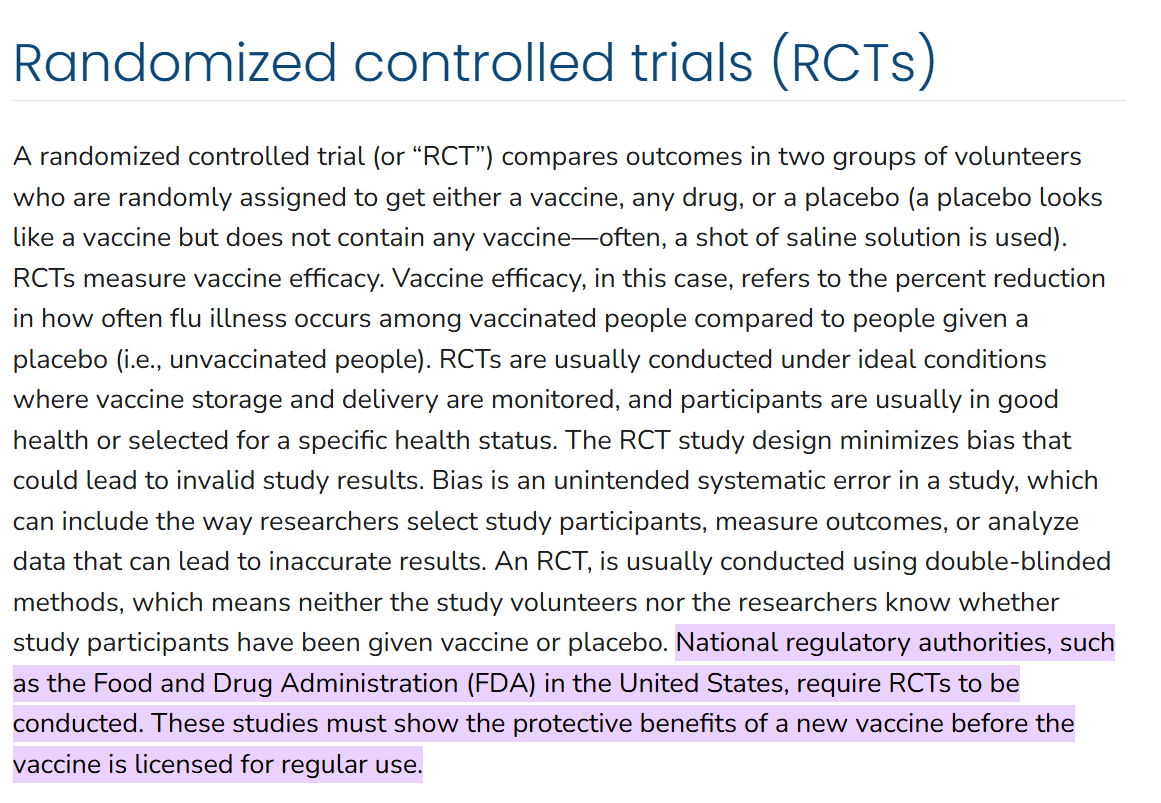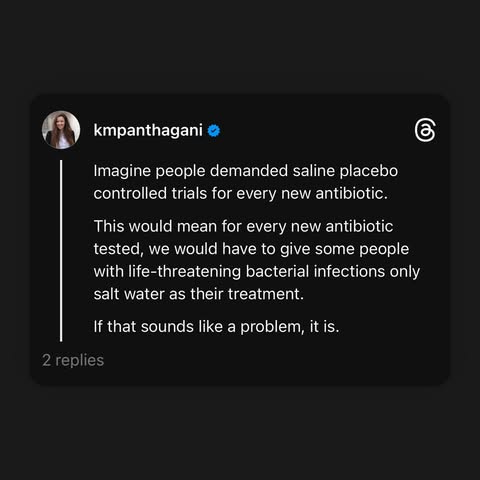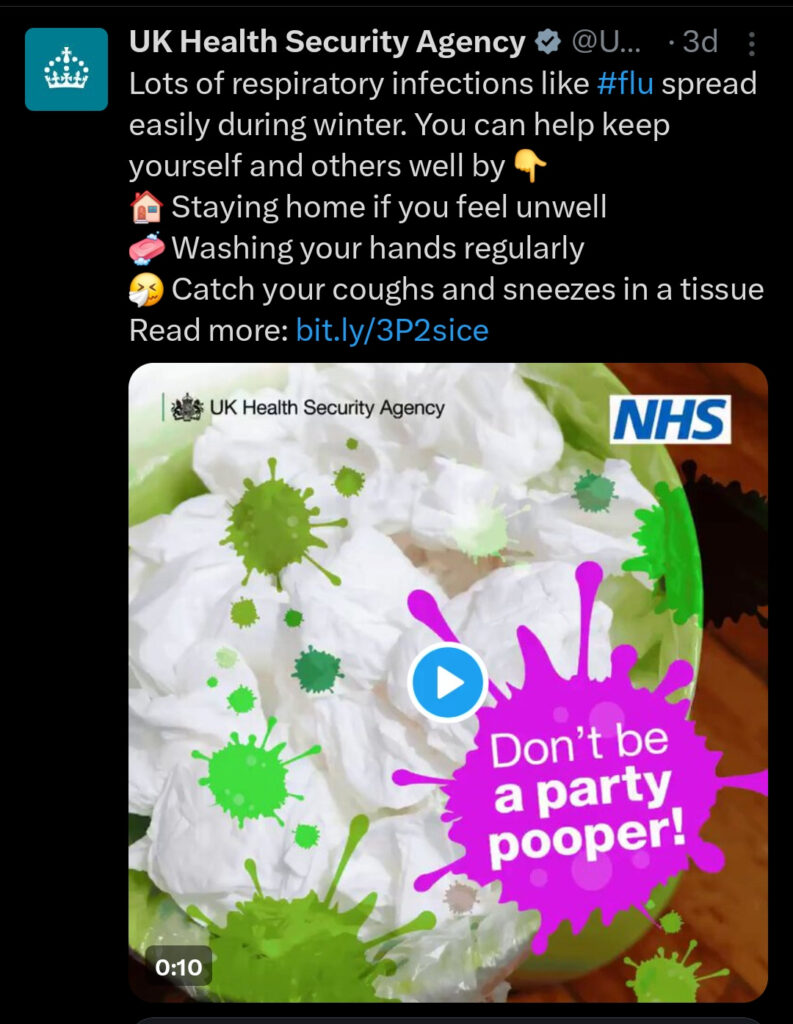Randomized Controlled Trials: The Backbone of Vaccine Safety

Last week, I received an email from a reader questioning whether vaccines undergo proper placebo-controlled testing:
The timing was particularly interesting, as PolitiFact had just published a comprehensive fact-check addressing similar claims made by Senator Ron Johnson about childhood vaccines. While PolitiFact effectively debunked this misconception, we wanted to provide our readers with even more detailed information about how vaccines are actually tested and approved. (We’ve previously addressed other points raised in the email about vaccine liability and physician incentives— or lack thereof.)
This topic was also excellently covered by Dr. Kristen Panthagani, who provided a clear explanation of why vaccine testing protocols vary depending on whether existing treatments are available.
Her insights help illuminate why some trials compare new vaccines against existing ones rather than placebos – an ethical choice that protects study participants while maintaining scientific rigor.
Let’s dive deep into how vaccines are really tested and why the claim that they skip placebo-controlled trials is demonstrably false. Not only are such trials a cornerstone of vaccine development but they’re actually required by law before new vaccines can be licensed for use. Here we go…
The Foundation: Double-Blind, Placebo-Controlled Trials
Randomized controlled trials (RCTs) form the cornerstone of vaccine development. In these studies, participants are randomly assigned to receive either the vaccine or a placebo (typically a saline solution). Neither the participants nor the researchers know who received which – making them “double-blind” – which helps eliminate potential bias in assessing results.
Here’s a screenshot from the CDC website about RCTs:

Here are just some examples of major double-blind, placebo-controlled vaccine trials:
-
A Phase III trial of the Sinovac COVID-19 vaccine in healthcare professionals
-
The Bangkok trial of a bivalent recombinant glycoprotein 120 HIV-1 vaccine
-
Phase 1 trials of the HEV-239 Hepatitis E vaccine in healthy adults
-
Vietnam-based trials of an inactivated influenza A/H5N1 vaccine
The Legal Requirements
To fully understand this issue, it’s important to know that randomized controlled trials aren’t just a scientific best practice – they’re actually required by law for vaccine approval in the United States. The FDA’s requirements for “adequate and well-controlled studies” are explicitly outlined in Title 21 of the Code of Federal Regulations (21 CFR 314.126), which specifies that such studies must include:
-
Clear objectives and analysis methods
-
A valid comparison with a control group
-
Methods to minimize bias (such as randomization and blinding)
-
Well-defined and reliable methods to assess responses
-
Adequate analysis of results to assess the effects of the intervention
For vaccines specifically, the FDA requires a progressive clinical development program that includes:
-
Phase 1 trials focusing on safety (20-100 people)
-
Phase 2 trials examining immune response and short-term side effects (several hundred people)
-
Phase 3 trials involving thousands of participants in randomized controlled studies
The law explicitly states that “uncontrolled studies or partially controlled studies are not acceptable as the sole basis for the approval of claims of effectiveness” (21 CFR 314.126(e)). This means that proper RCTs aren’t optional – they’re a legal requirement for vaccine approval.
But the COVID-19 vaccines skipped RCTs, right? WRONG.
A common misconception about COVID-19 vaccines is that they bypassed randomized controlled trials (RCTs) in their rush to market. This claim often appears in social media posts and vaccine-skeptical circles. However, a detailed methodological analysis published in the Journal of Pediatric Health Care thoroughly examined the RCTs conducted for both the Pfizer and Moderna vaccines, using rigorous scientific assessment tools. This analysis helps definitively refute claims about the lack of proper trials. (Links to the COVID-19 vaccine RCTs are included in the article if you’d like to review them.)
Let’s look at what the researchers found…
Both Pfizer and Moderna vaccines underwent rigorous Phase 3 RCTs:
-
They used proper randomization (1:1 ratio between vaccine and placebo groups)
-
They were double-blind (participants and most study personnel didn’t know who got vaccine vs placebo)
-
They used proper control groups with saline placebo
-
They had large sample sizes
-
They carefully tracked outcomes and adverse events
Specific details about the control groups:
-
Pfizer placebo: 0.3 mL of saline per dose
-
Moderna placebo: 0.5 mL of saline
-
Both were administered exactly like the real vaccine (in deltoid muscle)
The trials met most criteria on the Critical Appraisal Skills Programme (CASP) checklist, which is a rigorous tool for evaluating RCT quality. The few limitations noted were mainly due to the urgent pandemic timeline, not fundamental flaws in trial design.
The trials also followed proper scientific reporting guidelines through CONSORT (Consolidated Standards of Reporting Trials).
Special Circumstances in Vaccine Testing
While new vaccines require full placebo-controlled trials for initial approval, there are several specific situations where the testing process may look different:
Annual Updates: Flu and COVID-19 Vaccines
Both influenza and COVID-19 viruses frequently mutate, requiring regular vaccine updates. Since the basic vaccine platforms have been proven safe and effective through rigorous initial testing, annual reformulations don’t require new placebo-controlled trials. Instead, they undergo careful testing for immune response and safety monitoring, similar to how we update flu vaccines each year.
Emergency Situations: Speed Without Compromise
During public health emergencies such as the COVID-19 pandemic, vaccine development may be accelerated – but this doesn’t mean skipping safety steps. Instead of the traditional sequential approach where each phase must be fully completed before the next begins, the process can be made more efficient by:
-
Running trial phases in parallel (e.g., Phase 2 starts while Phase 1 is still collecting long-term data)
-
Beginning manufacturing while trials are ongoing
-
Streamlining administrative processes and regulatory reviews
-
Prioritizing review of trial data
…All while maintaining critical safety protocols and required RCTs. This approach was successfully demonstrated during COVID-19 vaccine development, as detailed above.
Bridge Studies
When extending a proven vaccine’s use to new age groups, researchers may conduct “bridging studies.” These compare immune responses in the new group to those in populations where the vaccine’s effectiveness has already been demonstrated. This approach is both scientifically sound and ethically appropriate, as it avoids unnecessarily withholding proven vaccines from control groups.
Ongoing Safety Monitoring
The CDC maintains multiple vaccine effectiveness networks that continue to study vaccines after approval. This post-marketing surveillance helps ensure safety and effectiveness in real-world conditions across diverse populations.
Conclusion
So the next time someone claims vaccines aren’t tested in double-blind, placebo-controlled trials, you can confidently set the record straight. Not only do these trials exist – they’re an absolute requirement for vaccine approval! While the process may be adapted for special circumstances like annual updates or emergencies, the fundamental commitment to rigorous scientific testing never wavers. Vaccines remain one of the most thoroughly tested and carefully monitored medical interventions in history.
Stay curious,
Unbiased Science
P.S. Did you find this deep dive valuable? Please consider becoming a paid subscriber to support our work. While we’ll always keep our content free and accessible to everyone (because we believe good science should be available to all), paid subscriptions make it possible for us to continue producing thorough, well-researched analyses like this one.
Your support helps us:
-
Dedicate more time to in-depth research
-
Access scientific journals and databases
-
Create clear, evidence-based content that fights misinformation
-
Maintain our commitment to keeping these resources free for everyone
Subscribe now to join our community of science enthusiasts and critical thinkers. We are so very grateful for your support!






